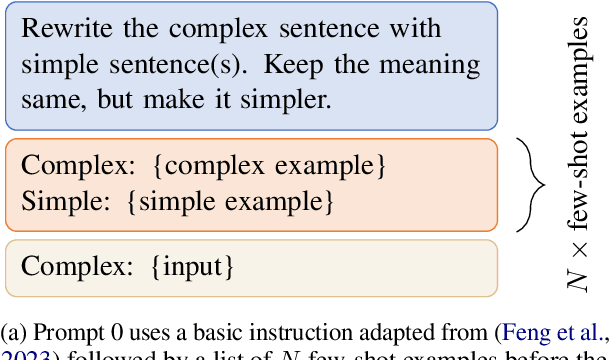Tannon Kew
EMTeC: A Corpus of Eye Movements on Machine-Generated Texts
Aug 08, 2024Abstract:The Eye Movements on Machine-Generated Texts Corpus (EMTeC) is a naturalistic eye-movements-while-reading corpus of 107 native English speakers reading machine-generated texts. The texts are generated by three large language models using five different decoding strategies, and they fall into six different text type categories. EMTeC entails the eye movement data at all stages of pre-processing, i.e., the raw coordinate data sampled at 2000 Hz, the fixation sequences, and the reading measures. It further provides both the original and a corrected version of the fixation sequences, accounting for vertical calibration drift. Moreover, the corpus includes the language models' internals that underlie the generation of the stimulus texts: the transition scores, the attention scores, and the hidden states. The stimuli are annotated for a range of linguistic features both at text and at word level. We anticipate EMTeC to be utilized for a variety of use cases such as, but not restricted to, the investigation of reading behavior on machine-generated text and the impact of different decoding strategies; reading behavior on different text types; the development of new pre-processing, data filtering, and drift correction algorithms; the cognitive interpretability and enhancement of language models; and the assessment of the predictive power of surprisal and entropy for human reading times. The data at all stages of pre-processing, the model internals, and the code to reproduce the stimulus generation, data pre-processing and analyses can be accessed via https://github.com/DiLi-Lab/EMTeC/.
Turning English-centric LLMs Into Polyglots: How Much Multilinguality Is Needed?
Dec 20, 2023Abstract:The vast majority of today's large language models are English-centric, having been pretrained predominantly on English text. Yet, in order to meet user expectations, models need to be able to respond appropriately in multiple languages once deployed in downstream applications. Given limited exposure to other languages during pretraining, cross-lingual transfer is important for achieving decent performance in non-English settings. In this work, we investigate just how much multilinguality is required during finetuning to elicit strong cross-lingual generalisation across a range of tasks and target languages. We find that, compared to English-only finetuning, multilingual instruction tuning with as few as three languages significantly improves a model's cross-lingual transfer abilities on generative tasks that assume input/output language agreement, while being of less importance for highly structured tasks. Our code and data is available at https://github.com/ZurichNLP/multilingual-instruction-tuning.
BLESS: Benchmarking Large Language Models on Sentence Simplification
Oct 24, 2023



Abstract:We present BLESS, a comprehensive performance benchmark of the most recent state-of-the-art large language models (LLMs) on the task of text simplification (TS). We examine how well off-the-shelf LLMs can solve this challenging task, assessing a total of 44 models, differing in size, architecture, pre-training methods, and accessibility, on three test sets from different domains (Wikipedia, news, and medical) under a few-shot setting. Our analysis considers a suite of automatic metrics as well as a large-scale quantitative investigation into the types of common edit operations performed by the different models. Furthermore, we perform a manual qualitative analysis on a subset of model outputs to better gauge the quality of the generated simplifications. Our evaluation indicates that the best LLMs, despite not being trained on TS, perform comparably with state-of-the-art TS baselines. Additionally, we find that certain LLMs demonstrate a greater range and diversity of edit operations. Our performance benchmark will be available as a resource for the development of future TS methods and evaluation metrics.
 Add to Chrome
Add to Chrome Add to Firefox
Add to Firefox Add to Edge
Add to Edge